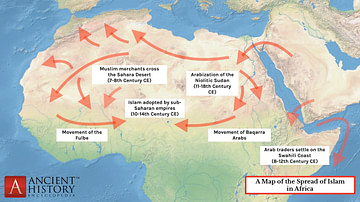Throughout the annals of history, few phenomena have had such a profound impact on the African continent as the spread of Islam. This religious and cultural movement, originating from the Arabian Peninsula, permeated through vast territories, leaving an indelible mark on ancient Africa. The transformative power of Islam not only shaped political structures but also influenced social dynamics and intellectual pursuits.
A Catalyst for Sociopolitical Change
The advent of Islam brought about a significant shift in power dynamics across ancient Africa. As Islamic armies expanded their territories through conquests, they established new political entities that adhered to Islamic principles. These states were characterized by centralized authority under Muslim rulers who governed with justice and fairness according to Sharia law.
One notable example is the Kingdom of Kanem-Bornu in present-day Chad and Nigeria. Founded by Mai Idris Alooma in the 9th century CE, this empire embraced Islam as its state religion and became a center for Islamic scholarship and trade. The adoption of Arabic script facilitated administrative efficiency while promoting literacy among its subjects.
An Intellectual Renaissance
The spread of Islam also sparked an intellectual renaissance throughout ancient Africa. With it came knowledge from distant lands, including advancements in mathematics, astronomy, medicine, and philosophy that had flourished within Islamic civilization.
In West Africa’s Mali Empire during the reigns of Mansa Musa (1312-1337) and his successor Mansa Sulayman (1341-1360), Timbuktu emerged as a renowned center for learning attracting scholars from far-flung regions seeking enlightenment within various fields such as theology or jurisprudence.
Social Cohesion Through Shared Faith
Beyond politics and intellectual pursuits, the spread of Islam fostered a sense of social cohesion among diverse African communities. The egalitarian principles espoused by Islamic teachings provided a unifying force that transcended ethnic and tribal divisions.
In East Africa, the Swahili city-states along the coast embraced Islam as early as the 8th century CE. This adoption not only facilitated trade with Arab merchants but also led to cultural syncretism between Bantu traditions and Islamic practices. The fusion of these influences gave rise to unique coastal societies characterized by vibrant arts, architecture, and literature.
Conclusion
The expansion of Islam in ancient Africa was far more than just a religious conversion; it represented a profound cultural transformation that reshaped political structures, fueled intellectual growth, and promoted social cohesion. Through its influence on governance systems, education centers, and artistic expressions across the continent’s vast expanse, Islam left an enduring legacy that continues to shape contemporary African societies today.


